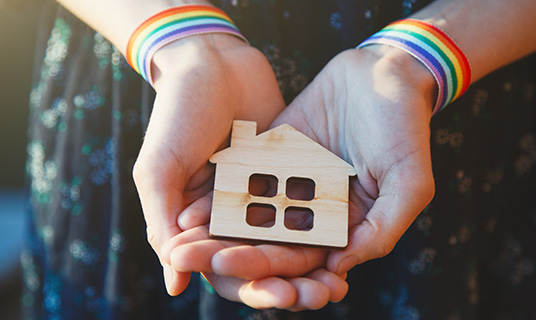Housing LGBTQ+
LGBTQ+ stands for lesbian, gay, bisexual, trans, queer or questioning. We’ve used the term LGBTQ+ on this page but we realise this doesn’t cover all the ways people define their gender or sexuality. Stonewall has a glossary that lists many more terms.
Across the globe, various pride events are held during June as a way of recognising the influence LGBTQ+ people have had around the world in securing LGBTQ+ rights.
There is still a way to go – not just in rights globally but in enabling everyone to be accepted for who they are in all situations they’re in.
For example, the as part of the mental health statistics reported by the Mental Health Foundation show that LGBTQ+ people are at higher risk of experiencing poor mental health, and LGBTQ+ people are disproportionately likely to end up homeless with akt reporting 24% of homeless young people (16-25) are LGBTQ+.
For those that have homes the problems don’t end the 2017 report No Place Like Home? found that 32% felt their neighbourhood was not a safe place to live in as an LGBTQ+ person, and that 21% were uncomfortable with repairs people entering their home - some went as far as concealing items that might reveal their gender identity or sexuality before such appointments. Just over a third of respondents thought their housing provider did not deal effectively with cases of harassment.
What can social housing providers do to improve this?
As always there is no straight forward answer to this problem, many stakeholders will need to be involved and the solutions diverse to create real change.
- Sign up to the HouseProud Pledge, this is a scheme that all social housing providers (housing associations, local authorities and ALMOs) can sign up to, to demonstrate their commitment to LGBTQ+ resident equality and support. It has been developed by HouseProud and the University of Surrey in association with residents, staff members and sector leaders to address the issues raised by the findings of ‘No Place Like Home?’, the largest study ever undertaken to understand LGBTQ+ experiences of social housing.
- Ensure all staff have appropriate training – this extends to the tradespeople that enter peoples’ homes. Having this visible gives residents confidence that their concerns will be listened to and enforces that you are a safe space. Stonewall offers a variety of training for all organisations.
- Take an active role in your residents’ concerns, with proactive policies in place to give them assurance that you are prepared to support them and deal with any harassment or discriminatory behaviour.
- Create communities! When we move away from just providing houses and into building communities we find that we improve the environment and peoples mental health with green spaces, and can enable connections between people.
When we all act, our combined effect will be great – we encourage all social housing providers to investigate LGBTQ+ housing and representation within their own organisations, and to take appropriate action with their findings.
For more information and recommendations similar to this article read ‘A new action plan for LGBTQ housing’ from Inside Housing.


